Gimme some truth | This Week in Business
Let's dig through annual reports to see what Activision Blizzard, EA, and Take-Two say when fewer people are listening
Sign up for the GI Daily here to get the biggest news straight to your inbox
We are constantly being lied to by the companies in this industry, and every other.
Well, maybe "lied to" is a bit strong, but we're constantly being given an incomplete picture, one that his been smeared with Vaseline to cover up wrinkles and digitally altered to really make those rose-colored highlights pop.
Every corporate communication we digest has been passed through the equivalent of a FaceApp filter several times before it gets to us, whether that's through advertising, press releases, or even interviews.
Thankfully, corporations don't send all their communication through those venues. For example, publicly traded companies also release annual reports to investors and regulators.
These reports can be lengthy documents densely packed with minutia about the business, and because companies tend to be careful about ticking off the money men and the government, annual reports don't emphasize spin quite as much as your standard company spokesperson.
It's not all brutal honesty, of course. After all, the company is making the case for why its current strategy is the one that will lead to a brighter future and greater growth, no matter what the current state of things is. But there's one part of an annual report where that kind of optimism is all but absent, and that's the "Risk Factors" section.
Risk Factors are sort of the Murphy's Law of corporate communications. Companies identify an extensive list of things that can go wrong, and they spell them all out for investors so even someone without in-depth knowledge about their specific industry could understand the myriad ways the business could go south, whether it's the company's fault or not.
And just because something is listed as a Risk Factor that doesn't mean it's likely to happen. It's more a recognition that if a thing did happen, it could hurt the business.
Since it's annual report season in the industry and we're going through these things anyway, we figured it would be a good time to compare and contrast the disclosures from the biggest third-party publishers – Activision Blizzard, Electronic Arts, and Take-Two Interactive – and see what each is worried about, and perhaps more importantly, what one might be worried about that its competitors aren't. (Take-Two hasn't released its 2022 annual report yet so we went with its 2021 report, which cuts off before the acquisition of Zynga closed.)
What keeps everybody up at night
Let's start with the least interesting bits, and I promise I'll try to get through this quickly because there are a whole lot of very common risks factors for companies, like the fact that they exist in competitive industries, their business is impacted by the health of the wider economy, or that a pandemic could throw a wrench in everybody's plans.
Then there are the more game-specific risks: software might have bugs, you need successful consoles to have successful console games, cybersecurity is a concern for everything from competitive balance to player privacy, and publishers' platform-holder partners are also their competitors.
That's not a comprehensive list by any means, but you get the picture. Most of the fears that turned up in all three companies' reports were understandable and well-established.
There was one shared risk that caught my eye though.
Climate change
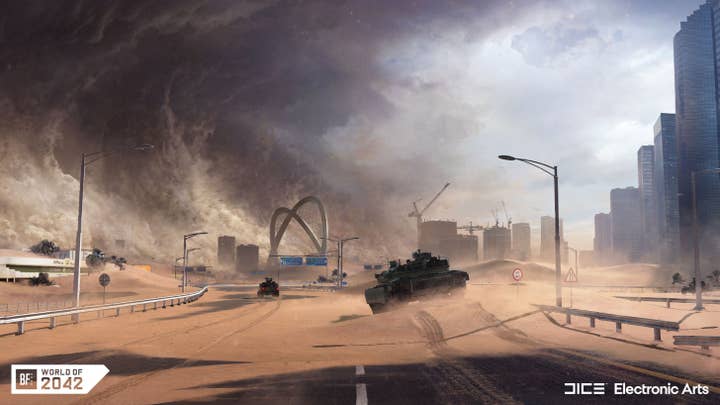
QUOTE | "Risks related to climate change are increasing in both impact and type. We do not expect significant near-term impacts to our operations as a result of climate change, but long-term impacts remain unknown. There may be business or operational risk due to the significant impacts that climate change could pose to our mobile infrastructure, the cost of energy, employees' lives, consumers' lives, our supply chain, our data centers or other operational disruptions from climate change-related weather events." – Activision Blizzard's annual report notes the risk of climate change.
By all rights this one shouldn't be eye-catching, but I have to admit, it's weird seeing the company with the conspicuously right-leaning leadership group pay any heed to climate change at all. But what the hey, let's just be happy they understand this is a problem and are on board with being part of the solution now, even if it's just because it poses a threat to their business, right?
STAT | $100,000 – According to Open Secrets, the amount of money Activision Blizzard CEO Bobby Kotick contributed to the No on Prop 30 campaign, which ultimately succeeded in defeating a California measure that would have imposed a 1.75% income tax on state residents earning more than $2 million a year and put that money toward climate change programs for wildfire response and prevention and electric vehicle incentives.
Yes, watching hundreds of thousands people evacuated as deadly wildfires sweep through your backyard and ruin air quality throughout the state is bad, but when you weigh it against Kotick losing less than two cents out of every dollar he makes each year as part of a contentiously extravagant pay package, surely you understand why the only right move here is to tell asthmatics and people with heart and lung disease to toughen up.
Ah well, I'm confident that will be only instance where Activision Blizzard's official position on a subject runs directly opposite the actions of its leadership. Let's move on to the Risk Factors that showed up in two of the three reports.
Two out of three: It's bad
Next up are the Risk Factors that were cited by two of the publishers we looked at, while the third didn't see them as a potential problem worth mentioning.
Some of these are interesting but not terribly meaningful. For instance, EA and Activision are worried about earthquakes given their headquarters lie along fault lines, while New York-based Take-Two does not.
Others are meaningful but not terribly interesting. Call of Duty company Activision and Grand Theft Auto publisher Take-Two are concerned about hitting their target ESRB ratings, while EA – which rarely ventures into M-for-Mature territory, does not.
But there are also a few that are interesting and potentially very meaningful, alerting investors to issues that could become hot-button topics a little further down the line.
Open source software gives the game away
QUOTE | "We use open source software in connection with some of the games and services we offer. Some open source software licenses require users who distribute open source software as part of their software to publicly disclose all or part of the source code to such software or make available any derivative works of the open source code on unfavorable terms or at no cost. The terms of various open source licenses have not been interpreted by courts, and there is a risk that such licenses could be construed in a manner that imposes unanticipated conditions or restrictions on our use of the open source software." – Activision Blizzard apparently admits it doesn't read the end-user licensing agreements. Take-Two's annual report contained a similar risk factor.
Could open source software terms force AAA publishers to give their games away?
Not only is this a great opportunity to link to XKCD's comic on dependency, it's also a glimpse at a tantalizing future where the same game publishers that get in a huff about the sanctity of their license agreements are forced to take a hit because they've been ignoring the agreements they clicked through without sufficient concern just like the rest of us.
This might actually be the most relateable multi-billion dollar companies have ever been.
I don't know why this would be in here unless Activision Blizzard and Take-Two are either unaware of what open source software is used in their games (which is not great in and of itself), or they're perfectly aware of it, they know they're obligated in some cases to give their games away, and they just figure in the unlikely case that someone calls them on it, it will be a dev without the resources to fight and win a protracted legal battle against a massive corporation.
Either way, it's a surprisingly ambivalent approach to the open source software creators' intellectual property rights coming from an industry that has long embraced anti-piracy measures as a moral imperative no matter what negative impacts they have on legitimate consumers. Speaking of which…
Piracy is insignificant
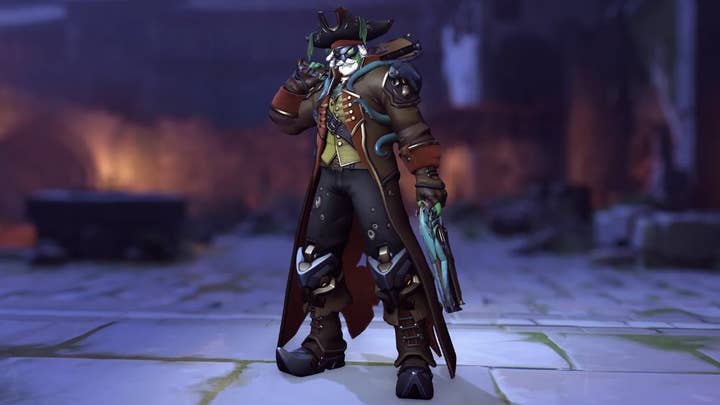
QUOTE | "We are aware that some unauthorized copying of our products and brands occurs, and if a significantly greater amount were to occur, it could negatively impact our business." – EA confirms that piracy would need to be significantly worse than it is now in order to negatively impact the business. Activision said much the same thing.
Good news everyone! We can call off the ESA now. Tell Nintendo's lawyers to stand down. Piracy is no longer significant, and we can stop all the lobbying against right-to-repair measures, stop fooling around with DRM, and stop designing games as fleeting archival-resistant experiences.
Glad that era's over with.
Brace for the AAApocalypse
Remember a few years back when Valve lowered the barriers to entry on Steam and suddenly everyone was worried about the Indiepocalypse and there being "too many indie games" because the gatekeepers were letting the unwashed masses in?
It seems platform-holders' lowering of barriers has resulted in something similar happening on consoles, and it's benefiting the hardware makers at the cost of publishers.
QUOTE | "Increased competition for digital 'shelf space' has put channel partners in more favorable bargaining positions in relation to such terms of distribution." – Take-Two in its Risk Factors reporting. Activision said basically the same thing in its own annual report.
I'm assuming this is specific to consoles because Activision repeatedly gives Sony and Microsoft as examples in that section of its report, and I'd be mildly surprised if Take-Two's mobile business prior to the Zynga acquisition (when this report was made) was relevant enough to necessitate such a note.
Caution: Bad tweets ahead
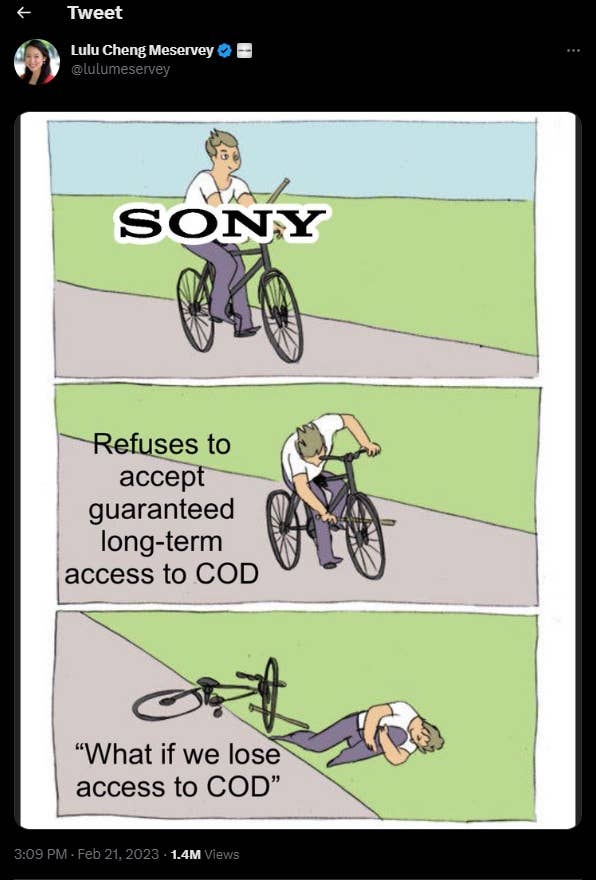
QUOTE | "We may also be subject to consumer backlash from comments made in response to postings we make on social media sites such as Facebook, YouTube, and Twitter." – Activision, naturally. Take-Two had essentially the same note in its filing.
I mean, Bobby Kotick is basically a backlash elemental, so this one makes sense. (Even if it does look like they took the keys to Kotick's Twitter account away when a California government agency filed the first gender discrimination suit in July of 2021.)
Too many eggs in too few baskets
One last thing Activision Blizzard and Take-Two have in common is that they are both leaning really hard on a small handful of franchises, so if something were to happen to one of them, look out.
QUOTE | "Grand Theft Auto products contributed 30.9% of our net revenue for the fiscal year ended March 31, 2022, and the five best-selling franchises (including Grand Theft Auto), which may change year over year, in the aggregate accounted for 83.2% of our net revenue for the fiscal year ended March 31, 2022." – Take-Two acknowledges its over-reliance on a few franchises could be a problem.
Then again, Take-Two has been the Grand Theft Auto show for about 20 years now, and it's worked to shed that perception over time as it has built NBA 2K, Red Dead Redemption, Borderlands, and BioShock into major franchises. And then there was the acquisition of Zynga, which closed after Take-Two's last annual report was filed and should bring that 83.2% number waaaay down.
QUOTE | "In 2022, revenues associated with our three franchises – Call of Duty, Warcraft, and Candy Crush – collectively accounted for approximately 79% of our net revenues – and a significantly higher percentage of our operating income." – Activision Blizzard is a three-trick pony.
That's not quite a record for Activision Blizzard, as 2021 saw those three properties combine for 82% of all revenues. However, the general trend since Activision Blizzard acquired King in 2016 has seen the company headed in the opposite direction of Take-Two, leaning more and more on its handful of hits.
STAT | 69% - The total percentage of Activision Blizzard revenues that were made up by its core franchises in 2016, the year it acquired King. The thing is, that 69% included revenues from four games: Candy Crush, Call of Duty, Warcraft, and Overwatch from when that game launched as a phenomenon.
While Activision Blizzard didn't indicate if it wanted to diversify its business in any way, it did acknowledge that reliance could come back to bite it in the future.
QUOTE | "Additionally, if the popularity of a franchise declines, as has happened in the past with other popular franchises, we may have to write off the unrecovered portion of the underlying intellectual property assets, which could negatively impact our business."
OK, but what are the odds of that happening? I mean, if you can't trust the publisher behind Guitar Hero, Tony Hawk, and Skylanders not to drive a successful franchise into the ground and salt the earth to ensure nothing can ever grow there again, who can you trust?
Perhaps most interesting here is that EA didn't list this as a problem.
STAT | 29% - The percentage of EA's revenue that came from its Ultimate Team loot box-based game modes, as included in its annual report for 2020. We don't know what that number is for more recent years because EA stopped disclosing it in more recent annual reports.
EA did acknowledge the risk of governments applying gambling laws to its Ultimate Team modes in its latest report, but it did not specify just how devastating it would be to the company if Ultimate Team were not able to continue on as an unregulated pseudo-gambling pursuit in games rated for all ages.
Along those same lines, it's awfully interesting to me that Activision and Take-Two's annual reports specifically called out the World Health Organization's adoption of the "gaming disorder" diagnosis and the threat of resulting legislation, while EA's did not.
Your problem, and your problem alone
At last, we come to the odd ducks, the Risk Factors that are interesting specifically because only one company sees them as a potential problem worth mentioning. Let's start with the big one that stood out to me in EA's annual report.
Warning: We might have principles
QUOTE | "In addition, we have taken actions, including delaying the release of our games and delaying or discontinuing content, features and services for our games, after taking into consideration, among other things, feedback from our community or geopolitical events even if those decisions negatively impacted our operating results in the short term... We expect to continue to take actions as appropriate, including actions that may result in additional expenditures and the loss of revenue." – EA in its annual report.
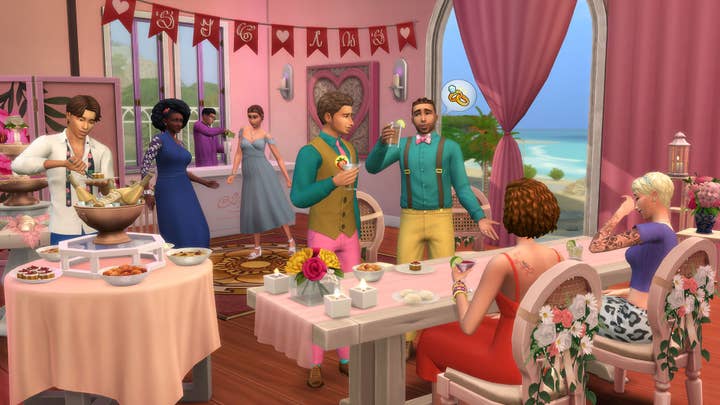
One example EA gave was halting sales of games in Russia after the invasion of Ukraine. Activision Blizzard and Take-Two have also halted sales in Russia, but they didn't bring it up in their annual reports the same way. Instead they spoke of the "conflict" between Russia and Ukraine (with no indication of an aggressor), and how that could lead to reduced demand for their products, or sanctions and other trade restrictions preventing them from doing business normally.
EA's risk factors allowed for a situation where it would pass up profits because it was the right thing to do; I suppose Take-Two and Activision Blizzard didn't think the risk of that was worth mentioning.
Star power
Activision Blizzard, EA, and Take-Two all noted how important it was to attract, manage, and recruit talent, but Take-Two went a step further.
QUOTE | "We are also highly dependent on the expertise, skills and knowledge of our key creative personnel responsible for content creation and development of our Grand Theft Auto and other hit titles and titles based on other brands. We may not be able to continue to retain these personnel at current compensation levels, or at all." – Take-Two in its Risk Factors.
Take-Two has long embraced having key creative talent leading its franchises. The Houser brothers, Sid Meier, Ken Levine… Randy Pitchford isn't actually a 2K employee, but he certainly has been the face of the Borderlands franchise.
Contrast that with Electronic Arts and Activision Blizzard, two companies that put their creators front and center right from their founding, but in recent years have dialed back the focus on key creatives.
There's a reasonable justification for that in that AAA development teams are so massive now it's beyond misleading to attribute them to any one creator, but there are other benefits to publishers downplaying talent.
It may leave them without a useful marketing tool when it comes to launching a new intellectual property – how much of Spore's hype was directly tied to Will Wright? – but I suspect it helps franchises survive the departures – or in the case of Call of Duty, forcible ejections – of their key developers a little better.
So what about Activision Blizzard's unique Risk Factors? There were a few, and you can probably guess some of them.
Activision Blizzard's got 99 problems and ongoing gender discrimination litigation accounts for several of them
QUOTE | "We have been, and in some cases continue to be, subject to legal proceedings regarding workplace concerns. The outcome of matters that have not been resolved remains uncertain, though such matters could be decided unfavorably to the Company and could have a material adverse effect on our business, reputation, financial condition, results of operations, income, revenue, profitability, cash flows, liquidity, or stock price." – Activision Blizzard addresses the elephant in the room.
The union menace
QUOTE | "We may be impacted by unionization or attempts to unionize by our workforce." – Activision Blizzard says its employees' right to organize is a threat to the business.
"We may be impacted by unionization or attempts to unionize by our workforce" Activision Blizzard in its Risk Factors
As you might have expected, Activision Blizzard added this line to its 2021 annual report, the first one filed after the gender discrimination lawsuits and Raven Software QA union push happened. I've never seen unions listed as a Risk Factor in another publisher's annual report, even though it's clear many of them wouldn't be thrilled with the idea of their employees unionizing.
STAT | 7% - The amount of Electronic Arts employees represented by a union, according to its 2020 annual report (all of them in Sweden working at DICE).
Coincidentally, just as unionization became such a hot button topic that Activision Blizzard labelled them a Risk Factor, EA stopped mentioning its own unionized workers in its annual reports as if they were some unsavory thing to be hidden from public view, like Ultimate Team revenues or something.
The MAGA threat
Here's the one I never expected Activision Blizzard to sound the alarm about.
QUOTE | "We are subject to the risks arising from adverse changes in economic and political conditions, both domestically and globally, including trends toward protectionism and nationalism…" – Activision Blizzard says xenophobic patriotism is bad for business, actually.
Oh wow, yeah, you always gotta be vigilant about protectionism and nationalism. Activision Blizzard may publish the industry's pre-eminent jingoistic military first-person shooter, but at least it recognizes the very real problems presented by the rise of political movements that stoke fear of other peoples and make the world we live in a smaller, more pitifully scared place.
QUOTE | "CHINA GAVE US COVID." – TV host and 2022 Republican Senate candidate for Pennsylvania Dr. Mehmet Oz stokes some good old Twitter xenophobia in March of 2022. Months later, Kotick would donate several thousand dollars to Oz's campaign, and an additional $5,000 to his Dose of Reality, Optimism & Zeal PAC.
Then there's Activision Blizzard chief administrative officer Brian Bulatao, who has donated thousands to former Secretary of State Mike Pompeo's political campaigns over the years.
QUOTE | "Bulatao isn't just any colleague of the Secretary of State. He is one of Pompeo's best friends, dating back to when they met at West Point as members of the class of 1986. The two have been business partners. And when Pompeo went to lead the CIA, then later jumped to State, he gave Bulatao top positions at both institutions." - A 2020 Politico article detailing Bulatao's alleged bullying of the State Department's inspector general, who was investigating Pompeo's actions and use of department resources. Trump later fired the inspector general on Pompeo's recommendation.
While Pompeo was often brought up as "the adult in the room" during Trump's clown car administration, he will be remembered for dropping that charade and donning the rainbow wig and floppy shoes to promise "a smooth transition to a second Trump administration" in the days after Trump's electoral defeat, furthering the lie at the heart of the January 6 insurrection.
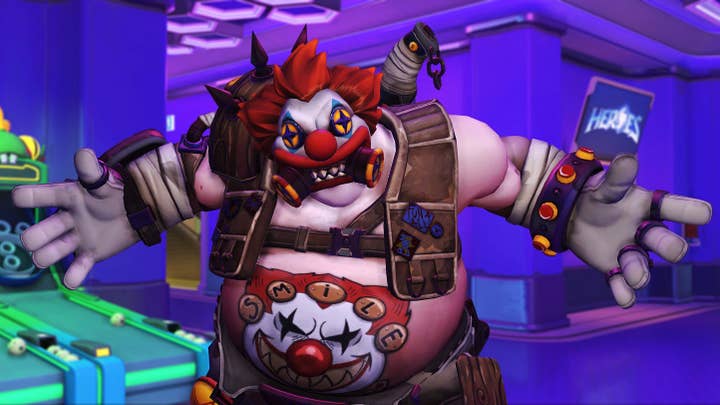
Much of Bulatao's donations were made before Pompeo cemented his legacy as a Trump toady, but $1,000 in donations to Pompeo's Champion American Values PAC was made in June of 2001, months after the attack on the Capitol, and months after he tweeted this:
QUOTE | "Woke-ism, multiculturalism, all the -isms – they're not who America is. They distort our glorious founding and what this country is all about. Our enemies stoke these divisions because they know they make us weaker." – In a tweet on the very last day of the Trump administration in January of 2021, Mike Pompeo gave a last-minute push to that nationalism trend Activision Blizzard is oh-so-worried about.
QUOTE | "Gaming is a cultural force, and for that force to reach as far as possible, we must attract and retain a highly talented and diverse workforce and build a welcoming and inclusive workplace… We see diversity and inclusion as foundational to our games, policies, and workforce." – Bulatao officially goes woke in Activision Blizzard's Environmental, Social, and Governance Report, released this week.
Pompeo must be disgusted with one of his best friends stoking such divisions to deliberately make the USA weaker.
You might think Bulatao was lying there, just saying whatever nonsense he thought would get the snowflake peons the company employs to stop whining about meaningless drivel like "diversity," "the right to organize," and "executives threatening to have us killed." But looking at the rest of the ESG report, it's possible that Activision Blizzard leadership doesn't quite understand this stuff.
QUOTE | "At Activision Publishing, we have found ways to use in-game experiences to honor and support the Veteran community that so inspires our Call of Duty franchise." - The opening sentence of the Diversity in Our Games section of the company's ESG report. In a separate part of the report breaking down the demographic diversity of the company, it notes "3% of our employees self-identify as Veterans."
Hooray consequences
Clearly, the things these companies and their leadership tell employees and the public don't always match up neatly with their actions when fewer people are paying attention.
And that's one of the reasons I like these reports. Because it's easy to look at the horror stories that have come out of companies like Activision Blizzard, Ubisoft, and Riot Games and think it doesn't matter.
You read the absolutely horrifying reports of terrible work cultures and reprehensible behavior by the people in charge, you hear some platitudes about change and a handful of image redemption efforts, and then so often that's it.
The next thing you see is another best-selling game and a record earnings victory lap conference call led by the same people who created and fostered those abusive workplaces.
And you feel hopeless that any of it mattered, that there were any actual consequences for the people ultimately responsible, that anyone out there actually cares enough about the harm these people have done to not just shrug their shoulders and buy the games or take a job to make those same people richer anyway.
And here, buried in an annual report filed with the US Securities and Exchange Commission, is a hopeful reminder that people really do care, and consequences really do exist.
QUOTE | "Recent litigation involving the Company relating to workplace and employee concerns… and related media attention and/or union campaigns has had, and can be expected to have, an adverse effect on our ability to attract and retain employees…
"These legal proceedings have negatively impacted our public reputation and, as a result, at various points in time since the institution of these legal proceedings some consumers have elected not to continue subscribing to one of our games, and it is possible that existing and potential players may decide not to play our games in the future. Some sponsors, partners, and advertisers have previously elected not to be associated with our brand due to this impact on our reputation, and others may so elect in the future."
Activision Blizzard's annual report is confirmation that lots of people out there care enough to put their principles into action and make a difference, even if every press release, trailer drop, and game announcement tries its hardest to paint the picture of a company that didn't miss a beat.
The rest of the week in review
STAT | 60 – The number of customer relations employees Ubisoft is laying off in North Carolina and Newcastle, part of continued efforts to cut costs that are expected to go on for another year and change.
QUOTE | "Dear friends, our PixelOpus adventure has come to an end." – The Sony-owned studio behind Concrete Genie announced that it is shutting down as part of a PlayStation organizational evaluation.
STAT | 1 – Honestly, the number of things this week will probably be remembered for by the industry. Here's hoping everyone picking up Zelda: Tears of the Kingdom enjoys it.
Sign up for the GI Daily here to get the biggest news straight to your inbox

